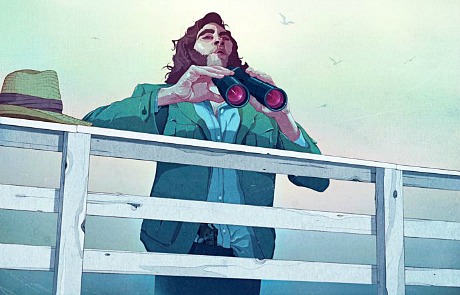“In shot #337 there is no face melting, less fire in the hair, fewer embers on the face, and the head explosion has been considerably obscured by the fire, as well as darkened to look less like flesh. We arrived at this shot (#337) after much cajoling and resistance from the filmmakers.” — excerpt from hacked email sent on 9.28.14 by Sony Pictures honcho Amy Pascal to Sony CEO Sony Kazuo Hirai. Pascal was referring to a scene in The Interview (Columbia, 12.25) which North Korean leader Kim Jong Un is killed. Hirai had asked Pascal to pressure the filmmakers, Seth Rogen and Evan Goldberg, to tone down the gore levels in this scene. He also asked Pascal to make sure the Kim Jong Un death scene isn’t included in versions of the film exhibited outside the U.S.
Day: December 10, 2014
Best Behavior
I’ve complained once or twice about Mike Binder‘s Black or White, a film about an inter-racial child custody battle, having been kicked around by politically correct lefties. Yesterday Binder, myself and Rogerebert.com critic Glenn Kenny discussed this and related racial issues. Binder got to explain himself and his film in a way that sheds a little light. The conversation would have been livelier if we hadn’t been so considerate and fair-minded with each other. Somewhere around the two-thirds mark things picked up when Kenny slapped me around for not being manly enough when it comes to handling the natural slings and arrows that come with being a samurai poet columnist. Again, the mp3.



(l. to r.) Black or White director-writer Mike Binder, Rogerebert.com critic and SomeCameRunning ruminator Glenn Kenny, and myself.
Last In The World to Praise Obvious Child, and Particularly Jenny Slate’s Performance
I’m so late to the discussion about the moderately miraculous Jenny Slate in Gillian Robespierre‘s Obvious Child that I feel a little foolish bringing it up. It took me two weeks to write this piece because I felt so conflicted about this. But Slate is so alive and extra-dimensional and spunky with the right blend of vulnerability and brilliance with sprinklings of depression and self-destruction…I was floored. I still am. I asked about doing a phoner with her a week ago — here’s the mp3.
Everyone saw Obvious Child 11 months ago at Sundance ’14 or when it opened last June. I didn’t fucking see it until two weeks ago, and I knew right away I’d been a complete putz for not making a greater effort. Because Slate’s performance did something that more than a few current award-level performances haven’t. She woke me up and made me want more.
Slate plays Donna Stern, a Brooklyn-residing bookstore employee and stand-up comedienne. She’s in her late 20s or early 30s, and with the balls to just follow whatever’s on her mind when doing her act, which is kind of free-formish and scattershot. She’s less of a funny lady who “tells jokes” than a performance artist who’s sometimes funny and sometimes not, but she’s always riffing about her life. Right away I was saying to myself “okay, this woman is obviously wide open and super-vulnerable, and she’s either going to die of a broken heart or she’s going to rocket into fame but she’s not middle-of-the-road steady or flinty. She’s a bit shaky. But who isn’t?
Straightjackets Are Always Useful, Always “Bleak”
Transcribed: “It restates the negativeness of the universe…the hideous lonely emptiness of existence…nothingness…the predicament of man forced to live in a barren Godless eternity, like a tiny flame flickering in an immense void with nothing but waste, horror and degradation forming a useless bleak straightjacket in a black absurd cosmos.”
What A Trailer! Good God! Smash Champagne Bottles!
There’s no point in trying to learn who cut this trailer for George Miller‘s Mad Max: Fury Road (you don’t want to know about the labrynthian, Gordian Knot-like culture of Warner Bros. marketing), but it’s certainly one of the craziest, most brilliantly assembled sell-jobs for an action film I’ve ever seen in my life, hands down. Does anyone know who cut it together? Mouth open, jaw hits chest. Then again a trailer is only as good as the material. Amazing stuff. Wonderfully luscious amber-butterscotch colors. Fated to be huge.
Man on Wire For Megaplex Idiots
The opening shot of this teaser for Robert Zemeckis‘s The Walk (TriStar, 10.2.15), a narrative remake of James Marsh‘s Oscar-winning documentary Man on Wire, tells you everything you need to know about the Hollywood-ization of a really great story that doesn’t need any Hollywood-ization…unless you’re looking to sell it to the morons. That ascending high-speed elevator shot of the Word Trade Center’s South Tower is pure Chris Nolan, pure Batman. Ditto Joseph Gordon-Levitt walking out on a metal beam and balancing himself on one foot…showoff crap. Man on Wire was great stirring cinema — The Walk is clearly a downmarket makeover. Zemeckis is re-telling the story of French high-wire artist Philippe Petit‘s walk between the World Trade Center’s twin towers on 8.7.74. I’m sure it’ll be half-decent — it’s too good a story — and I realize it’ll involve a ton of CGI. But they need to tone down the visual flamboyance. Less is more, simple and plain.
Fight Club Meets Stiletto Belle du Jour
“If a dominatrix is one who takes total control of her passive partner, then R100 is the cinematic equivalent of a kinky femme fatale in black leather and stiletto heels, cracking a whip and a smile. At least for the film’s first half, Japanese writer-director Hitoshi Matsumoto gets a kick out of tantalizing and torturing the viewer with his tale of a meek department store salesman whose bondage-club contract for a year’s worth of sexual masochism proves unbreakable — and painful to boot. Albeit more wacky than provocative in the end, R100 could become a cult fetish on VOD.” — from Rob Nelson‘s 2.3.14 Sundance review in Variety.
Did I just read the word “unbreakable”? Are you thinking what I’m thinking? S & M enthusiast Angelina Jolie needs to direct the English-language remake…please. It has her name on it.
One Of The Least Appealing Lead Characters in History of Cinema
“One of the fables on which Inherent Vice ruminates is The Long Goodbye, and the loping, unflustered movie that Robert Altman made of it, in 1973, with Elliott Gould as Marlowe. He, too, was looking for a vanished man with an English spouse, on the verge of the Pacific, and his search, like Doc Sportello’s, involved poking around a sanatorium for the mentally vexed, but what lent the puzzle its loose charm was the fact that Marlowe could only just be bothered to solve it, as opposed to staying home with his cat. At least there was a solution; to the ardent Pynchonite, however, making sense of any mystery makes no sense at all. The nailing of one crime will simply reveal another, deeper one, and then another, and so on, until you arrive at the vision of a society that is already cracked and crazed. Does Anderson stay loyal to that vision for two and a half hours? Absolutely. Will his audience be overjoyed to realize, around the ninety-minute mark, just how little of Inherent Vice is going to be wrapped up nice and neat? Hmmm.” — from Anthony Lane‘s New Yorker review of Paul Thomas Anderson‘s Inherent Vice.
SAG Noms: Aniston Surge, Selma Snub, Gyllenhaal Elbows Aside Oyelowo
I wake up at 5 am for nobody, especially after reading until 1 am. So I was sleeping when the SAG nominations were announced, and in a sense I almost went right back to sleep when I skimmed the list as it applied to achievement in feature films. Pretty much every nominee was expected, in large part because every nomination had been heavily and smartly campaigned (paid) for. The not-entirely-expected nominations went to Jennifer Aniston for her ripe lead performance in Cake and to Nightcrawler‘s Jake Gyllenhaal for his bulging-eyed, razor-sharp Nightcrawler sociopath…yes! What was behind the snubbing of Selma and particularly David Oyelowo‘s performance as Martin Luther King? Simple — Paramount did’t mail the Selma screeners out in time.
Tomorrow morning’s Golden Globe nominations are do-or-die for Oyelowo and Selma across the board, I should think. The fate of Angelina Jolie‘s Unbroken, also, will be on the line.
To hell with campaign mentalities — Tom Hardy should have been nominated for his knockout performances in Locke and The Drop. His work was sterling and world-class, and the Los Angeles Film Critics and Lunch-Break Association recognized that fact last weekend. Has the SAG flock ever nominated anyone who wasn’t well campaigned for?
Wait, wait…what happened to Jessica Chastain‘s expected Best Supporting Actress nomination for her work in A Most Violent Year? What happened there? The Best Supporting Actress nomination that went to Meryl Streep for her spirited Into The Woods performance (i.e., rote Streepism) should have been Chastain’s.
Huzzahs for Birdman for landing the most nominations — Best Actor (Michael Keaton), Best Supporting Actor (Edward Norton), Best Supporting Actress (Emma Stone) and Best Ensemble. And congrats to Boyhood for landing…uhm, two nominations. Ethan Hawke and Patricia Arquette for Best Supporting Actor and Actress, respectively. Fine, appropriate, pats on the back.

